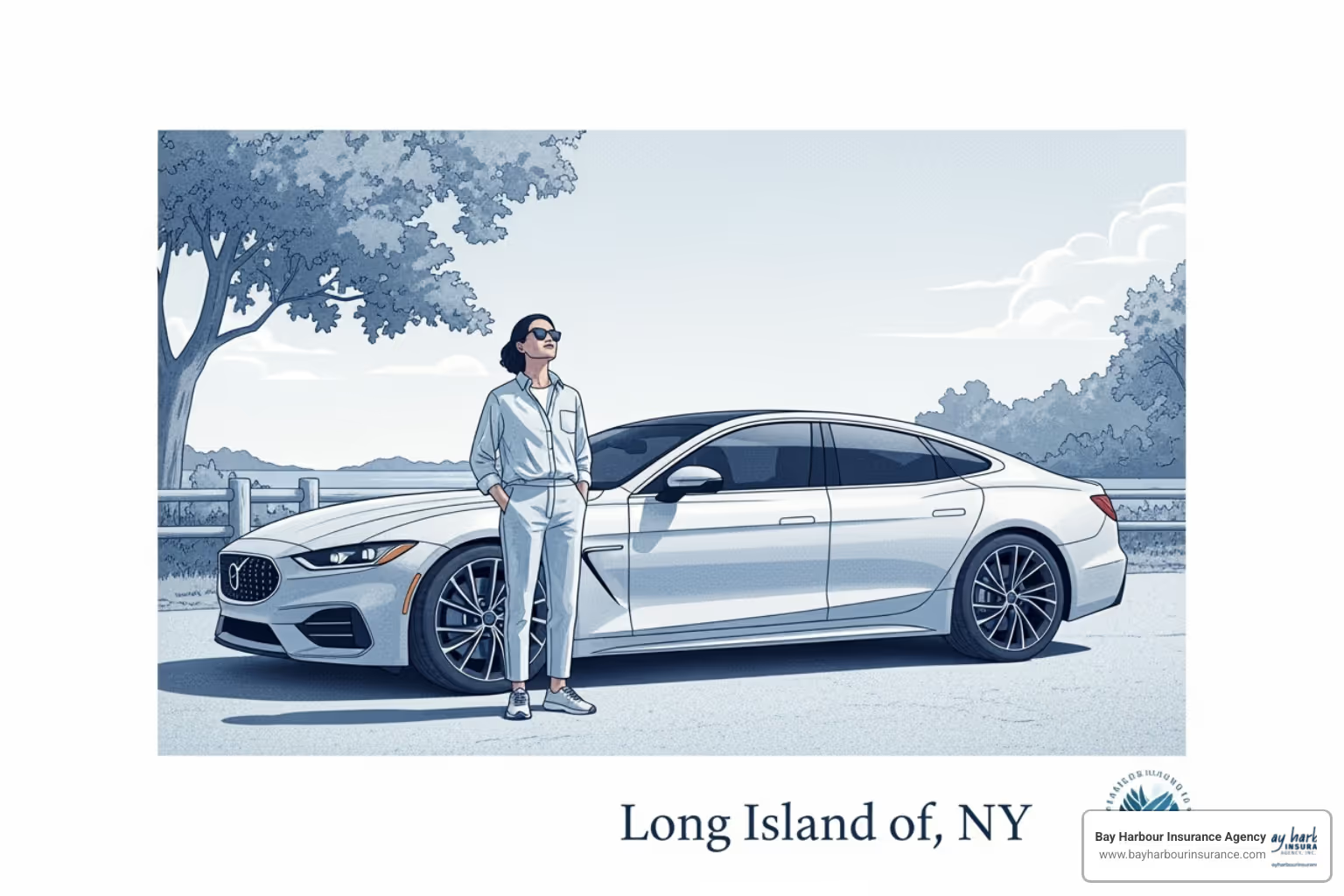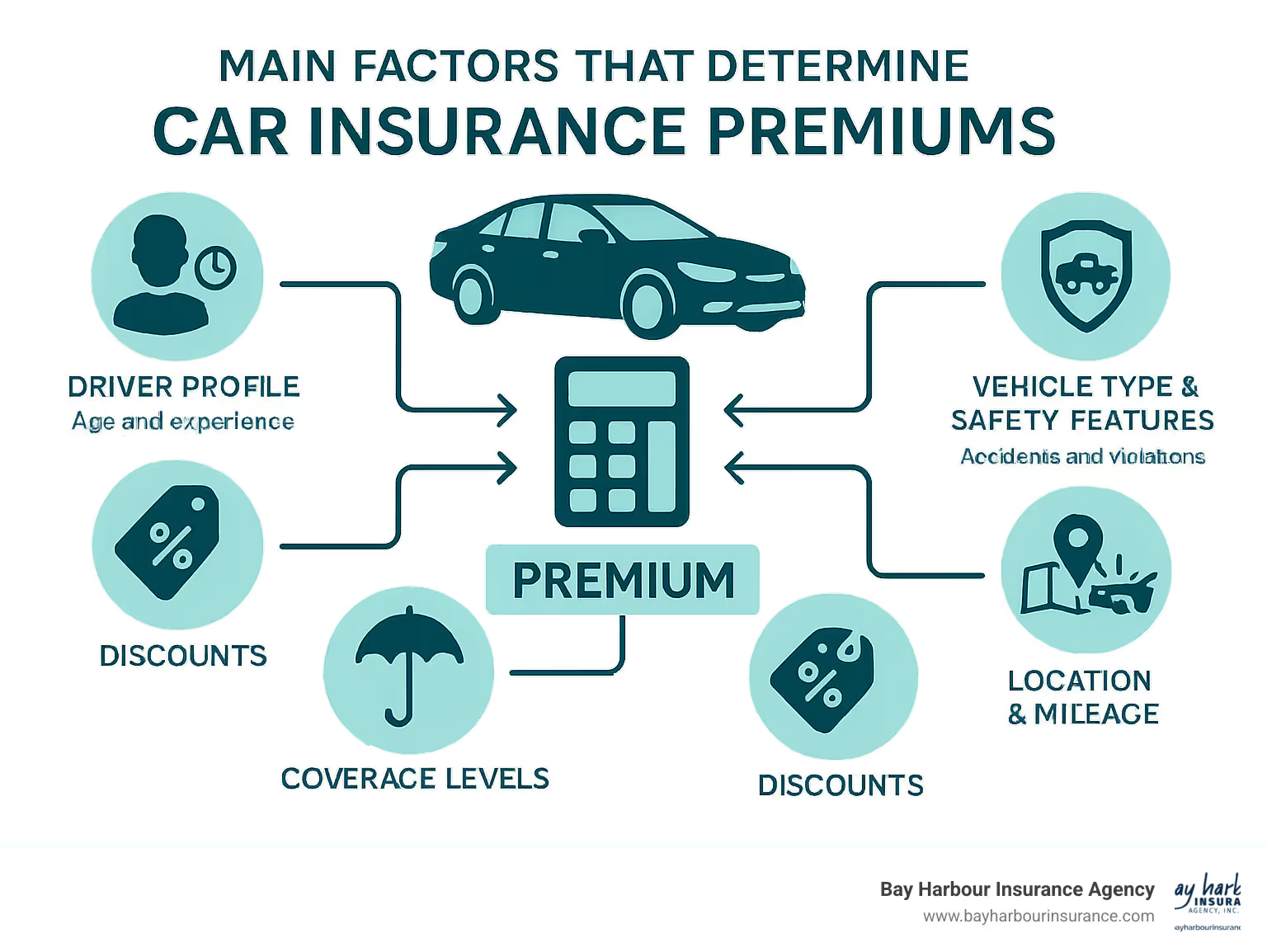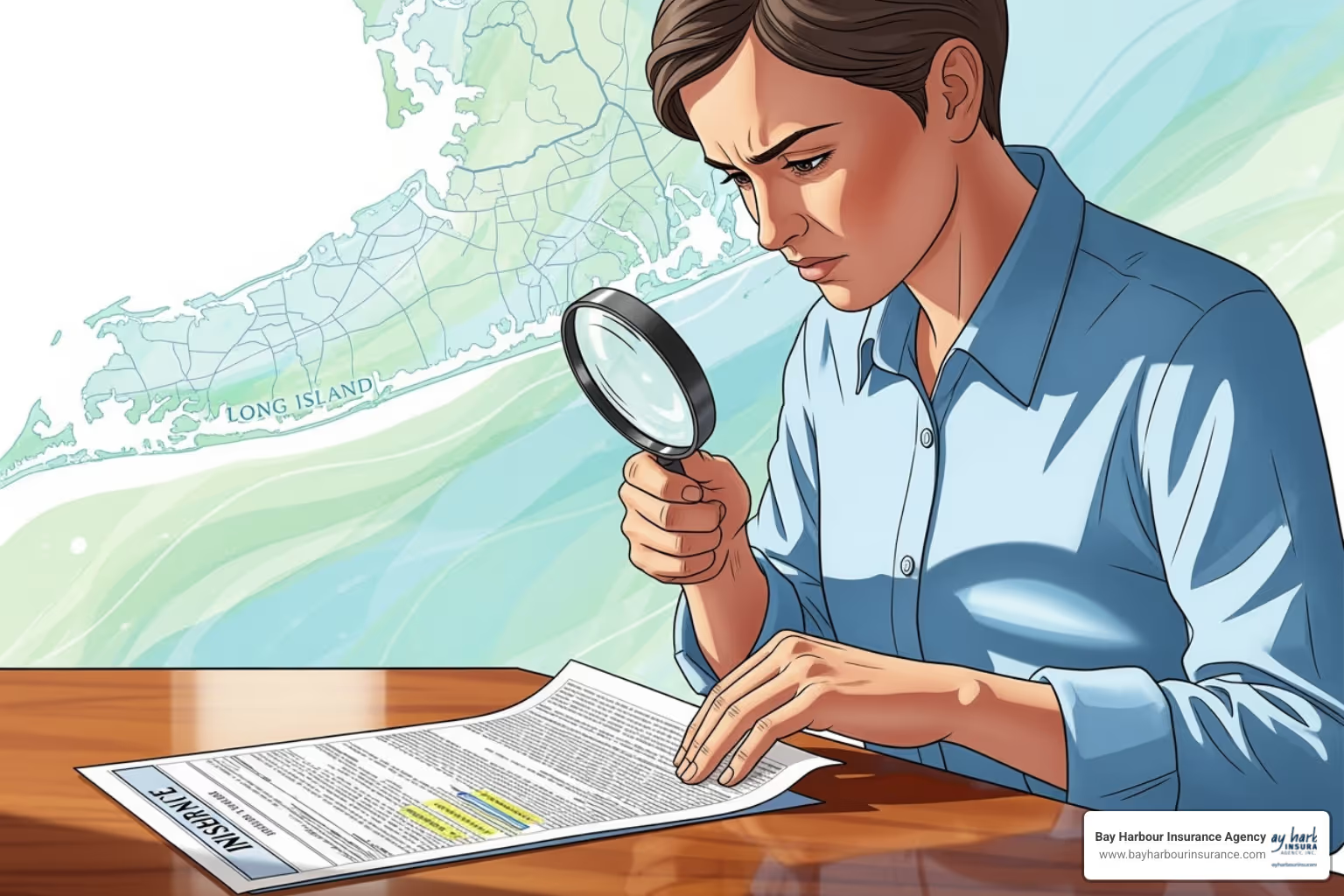
Don't Break the Bank: How to Get the Cheapest Car Insurance Quotes
September 19, 2025
Why Finding Cheap Car Insurance Matters for Your Budget
Finding cheap car insurance can save you hundreds, even thousands, of dollars annually without sacrificing necessary protection. Car insurance premiums can vary by nearly $1,000 per year between companies for the same coverage, and rates differ just as much depending on your state or province.
Quick ways to get cheap car insurance:
- Shop around - Compare quotes from multiple insurers
- Bundle policies - Combine home and auto for up to 20% savings
- Raise your deductible - Higher out-of-pocket costs mean lower premiums
- Ask about discounts - Good driver, student, and loyalty discounts can add up
- Use telematics - Safe driving apps can save up to 35%
- Maintain good credit - Your credit score affects rates in most states
Car insurance is essential financial protection, but that doesn't mean you should overpay. Never accept the first quote you receive.
The average cost of car insurance varies dramatically. Young drivers under 25 pay an average of $2,714 annually, while drivers over 50 pay just $1,536. A clean record can save you thousands, as an at-fault accident can cause premiums to jump from around $2,000 to over $4,000 per year.
The key is finding the best value, not just the lowest price. This guide will show you how to get genuine savings without cutting corners on essential coverage.

Understanding What Drives Your Car Insurance Rates
Car insurance rates are a complex calculation based on risk. Insurers predict how likely you are to file a claim and how costly it might be. Understanding these factors puts you in control of finding cheap car insurance.

Your Driver Profile and Habits
Your personal profile is one of the most significant influences on your premiums.
- Age and Driving Experience: Young drivers under 25 face the highest premiums (averaging $2,714 annually) due to being a higher statistical risk. Rates typically decrease after 25 and continue to drop for mature drivers (50+), who average around $1,536 annually.
- Marital Status: Married drivers are statistically less likely to be in accidents and may receive slightly lower rates.
- Location, Location, Location: Where you live and park your car impacts your rates. A busy area on Long Island like Patchogue will have different rates than a quieter spot like Sayville. Insurers analyze local accident frequency, theft rates, traffic density, and weather patterns.
- Annual Mileage: The more you drive, the higher your risk. Low-mileage drivers can often qualify for discounts.
- Credit Score Impact: In many states, insurers use a credit-based insurance score to help predict risk. A higher credit score often leads to lower premiums, as insurers have found a correlation between financial and driving responsibility.
For more detailed information about how these factors specifically apply to our New York auto insurance landscape, we encourage you to explore our guide on More info about NY auto insurance.
Your Vehicle's Impact on Premiums
Your vehicle's characteristics play a crucial role in determining your insurance costs.
- Make and Model: Luxury vehicles and sports cars with expensive parts are pricier to insure. Cheaper cars with smaller engines often mean lower premiums.
- Vehicle Age: Newer cars cost more to insure due to their higher value. As cars age and depreciate, the cost of collision and comprehensive coverage may decrease.
- Safety Ratings: Vehicles with high safety ratings from the IIHS or NHTSA often qualify for discounts because they reduce the risk of injury. A safer car means fewer and less costly claims. We highly recommend you Check your car's safety rating to see how your vehicle stacks up.
- Theft Rates: If your car model is a frequent target for thieves, your comprehensive coverage will likely be higher. You can also check for potential issues with your vehicle through NHTSA - lists of Car Recalls & Defects.
How Your Driving Record Shapes Your Cost
Your driving history is a straightforward factor: a clean record is your best friend for finding cheap Long Island car insurance.
- At-Fault Accidents: A major red flag for insurers. Drivers with an at-fault accident can see their premiums rise to around $4,389 annually.
- Traffic Violations: Speeding tickets and other moving violations contribute to higher premiums. A ticket can raise your premium to nearly $3,990 annually.
- Claims History: Frequent claims, even for non-accident incidents like theft, can signal a higher risk to insurers.
- Clean Record Benefits: Maintaining a spotless driving record for several years is one of the most effective ways to secure and maintain low rates.
Proven Strategies for Getting Cheap Car Insurance
Finding cheap car insurance is achievable with a few proactive steps. You can significantly slash your premiums by being a smart shopper instead of just accepting the first quote you receive.

Most of these strategies don't require lifestyle changes—just knowing what to ask for and making smart policy adjustments.
Open uping Discounts: The Easiest Way to Save
Many drivers overpay simply because they don't ask about available discounts. The biggest money-saver is often multi-policy bundling. Combining your car insurance with home, renters, or business insurance can save up to 20%. We've written a guide on how to save by bundling home and auto because the savings are so substantial.
Other key discounts include:
- Multi-car discount: Insure multiple vehicles with the same company.
- Good student discount: For younger drivers maintaining a B average or higher.
- Safe driver telematics programs: Apps that monitor your driving habits can save you up to 35%.
- Defensive driving courses: Completing an approved course in New York can earn you a discount.
- Loyalty discounts: For staying with the same insurer (but always compare rates periodically).
- Winter tire discounts: Can save up to 5% in areas like Long Island.
- Electric or hybrid vehicle discounts: Recognizes the safety and environmental benefits of these cars.
- Senior and retiree discounts: For experienced drivers who may drive less.
Ask your independent agent about every discount you might qualify for. They add up quickly!
Adjusting Your Policy for Lower Premiums
You have direct control over several policy aspects that affect your premium.
- Raise your deductible: Choosing a higher deductible (e.g., $1,000 instead of $500) lowers your premium. Ensure you can afford this amount out-of-pocket.
- Review your coverage: As your car ages and its value drops, you might not need the same level of collision or comprehensive coverage.
- Pay your premium in full: Paying annually instead of monthly often earns a discount.
- Qualify for low mileage discounts: If you work from home or have retired, your reduced driving means less risk and lower rates.
How to Find Genuinely Cheap Car Insurance Quotes
The single most powerful strategy for finding cheap car insurance is comparison shopping. Premiums can vary by nearly $1,000 per year between companies for the same coverage, so this step is essential.
Using Long Island local independent insurance agents like us at Bay Harbour Insurance Agency makes a huge difference. We do the legwork for you, comparing rates from multiple insurance companies to find the best value. Our loyalty is to you, not a single insurer.
When shopping, ensure you're comparing apples to apples. All coverage limits, deductibles, and driver information must be identical across quotes for a fair comparison. A quick online quote is a good start, but an agent can ensure all details are accurate for a final, reliable price.
Ready to see what's available? Check out our guide on how to compare top NY car insurance companies.
Beyond the Price Tag: Choosing the Right Policy
While finding cheap car insurance is important, the lowest price isn't always the best value. A cheap policy that fails to protect you isn't a good deal. It's crucial to look beyond the premium to understand your coverage, the insurer's service, and the accuracy of your quote.

Mandatory vs. Optional Coverage in New York
New York legally requires a minimum amount of car insurance. This mandatory coverage is designed to protect others on the road.
- Liability Insurance (Bodily Injury and Property Damage): The foundation of any policy. It pays for injuries to others and damage to their property if you're at fault. We always recommend carrying more than the state minimum.
- Personal Injury Protection (PIP): Also called "no-fault" insurance, PIP covers medical expenses and lost wages for you and your passengers, regardless of who caused the accident.
- Uninsured/Underinsured Motorist (UM/UIM): Protects you if you're in an accident with a driver who has no insurance or not enough to cover your damages.
Optional coverages provide more complete protection:
- Collision Coverage: Pays for damage to your vehicle from a collision, regardless of fault. It's typically required for leased or financed cars.
- Comprehensive Coverage: Protects your vehicle from non-collision incidents like theft, vandalism, fire, or falling objects.
- Other Options: You can also add coverage for rental cars (Loss of Use), depreciation protection for new cars (Limited Waiver of Depreciation), and Accident Forgiveness.
To dive deeper into New York's specific requirements, read our guide on how to Understand NY insurance requirements.
The Importance of Good Customer Service and Perks
When things go wrong, good customer service is invaluable. Look for an insurer that offers:
- 24/7 Claims Support: Accidents don't happen on a 9-to-5 schedule.
- Online Policy Management: The convenience of managing your policy, making payments, and viewing documents online or via a mobile app.
- Flexible Payment Options: Insurers should offer multiple ways to pay and be transparent about any fees.
- Additional Perks: Look for valuable extras like a decreasing deductible for claim-free years, preferred auto repair networks, and roadside assistance.
We prioritize finding you an insurer that balances competitive rates with excellent customer service.
Ensuring Your Quote is Accurate
A car insurance quote is an estimated premium based on the information you provide. It's a snapshot, not a final guarantee.
- Information Needed for a Quote: To get an accurate quote, you'll need to provide personal information, address, driver's license details, vehicle information (VIN, mileage), driving habits, and desired coverage.
- Verifying Details: Honesty is crucial. Any inaccuracies can change your final premium or cause issues during a claim. An agent can help verify all details for an accurate price.
- Avoiding Hidden Fees: Ask about any installment fees or down payment requirements. A seemingly cheap car insurance quote might hide extra charges.
We pride ourselves on providing transparent and accurate quotes. To get started, visit our page on how to Get accurate NY vehicle insurance quotes online.
Frequently Asked Questions about Car Insurance
We get a lot of questions about car insurance. Let's clear up some of the most common points of confusion.
What is the difference between standard and non-standard car insurance?
Most drivers qualify for standard car insurance, which is offered to those considered average risk. If you have a relatively clean driving record and drive a typical vehicle, you'll likely qualify for standard coverage with competitive rates and a full range of discounts.
Non-standard car insurance is for drivers considered high-risk. This can be due to multiple tickets, at-fault accidents, serious violations like a DUI, or having very little driving history. Some high-risk drivers may need an SR-22, a certificate proving they have minimum required coverage. Non-standard policies have higher premiums, but some insurers specialize in this market. With a clean driving record over time, you can usually move back to the standard market for better rates.
How long is a car insurance quote valid?
Insurance quotes have expiration dates. Typically, quotes are valid for 30 to 60 days, but this varies by company.
During this quote validity period, the rate should remain the same, assuming your information doesn't change. However, insurance rate changes happen frequently due to shifting market conditions. If you find a great rate, it's smart to secure it sooner rather than later before it's no longer available.
How can I access my digital proof of insurance?
New York accepts digital proof of insurance, which is far more convenient than a paper card.
- Mobile apps: Most insurers have an app where you can easily access your digital ID card.
- Digital wallets: Many insurers allow you to add your insurance card to your phone's digital wallet, like Apple Wallet, for quick access.
- Email proof: You will likely receive a PDF of your insurance card via email. It's a good idea to download this to your phone so you can access it without a cell signal.
While state acceptance of digital proof is convenient, you must be able to produce it when requested. This means keeping your phone charged and having the proof readily accessible.
Conclusion
Finding cheap car insurance is about being a savvy shopper, not just hunting for the lowest price. A cheap policy that doesn't protect you when you need it most isn't a good deal—it's an expensive mistake.
As we've shown, factors like your age, your location on Long Island, and your driving history all affect your premium. The empowering part is that you are not powerless in this equation.
The strategies we've shared are proven methods to save money. Bundling policies can save you up to 20%, a clean driving record is your golden ticket to lower rates, and shopping around is essential, as rates can vary by nearly $1,000 between companies for identical coverage.
Cheap car insurance that doesn't provide adequate protection is worthless. That's why look beyond the price tag, understand your coverage, and choose an insurer who will be there for you after an accident on Sunrise Highway.
As an independent agency serving Long Island, from Holbrook to Bellport, Bay Harbour Insurance Agency helps you find the best value. We don't work for one insurance company; we work for you. Our job is to cut through the confusion, compare your options, and find that sweet spot where affordability meets solid protection.
Your financial peace of mind is worth the effort. Ready to find what real value in car insurance looks like for you?

